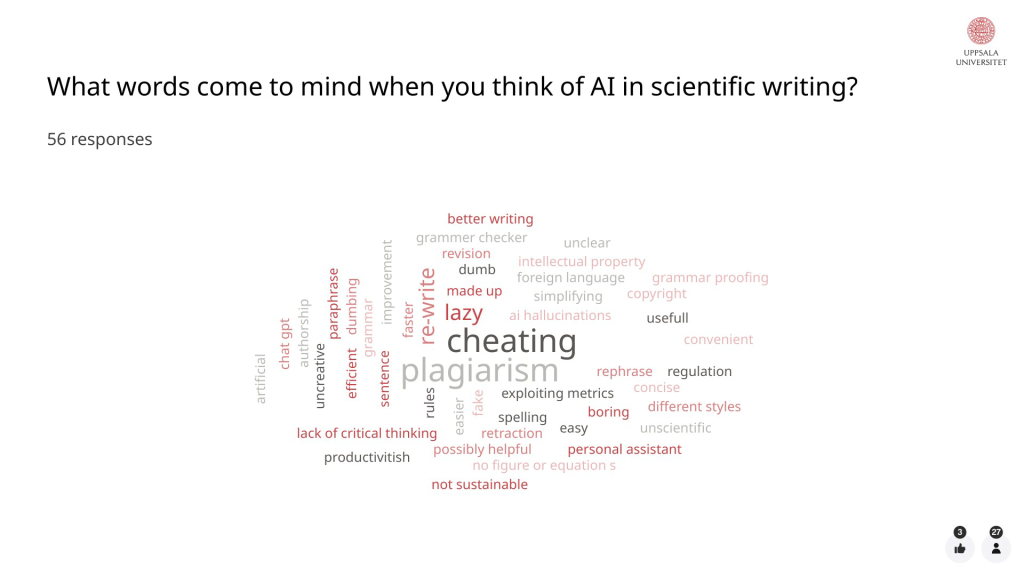ChatBPT seems to be the answer to all of our questions today. Or so it seems, given all the ways people find to use the tool for advice. The last couple of months I’ve heard students talking about writing entire assignments, documentarians writing scripts, and people asking it for dating advice, which for me feels downright borderline dystopic.
Inevitably, this technology is used in academia as well, a topic which was discussed in the course Scientific Writing, examined by Dolly Kothawala, this past December. The course was a faculty wide PhD course, meaning that there were primarily students from STEM subjects, a setting that usually makes me and my colleague Andreas Bergqvist with our dubious qualitative methods approach to scientific research feel a bit out of place. Towards the end of the course, we had a seminar where Sarah Shakil asked a couple of questions about the usage and perception of different AI-based tools in our work and writing. Here, I will admit my prejudice towards my dear co-PhD-students. I thought that the optimism would be overflowing, and that people would break out in song praising the almighty Chat-Mini-Me. The following slide represents the actual direction of the discussion:

I came out of the class quite optimistic and inspired. One reason being that the discussion we had during the class was what I envisioned academia to be, a high tempo discussion that moved between present day realism and future dystopia, tossing and turning the different perspectives back and forth. The fact that two of our research groups’ projects are about how these new technologies affect work environment and work engagement was of course a contributing factor too (Current Research Projects – Human Technology and Organisations Research Group).
The main reason for me leaving the class optimistic was that despite people being somewhat towards the negative side, most people did admit using it regularly, yours truly included. “Hypocrites!” some might say, but to me it showed that my dear co-PhD-students are curious but skeptical, understanding the practical usefulness in the technology, but also the risks and downsides, and having people with this mindset in academia gives me hope for the future. All and all, I do share this curious skepticism. On the one hand, it is really convenient to have a grammar checker, a translator, an email diplomatizer. On the other, using texts that are completely Chat-Hihihi generated is plagiarism, and I’m getting somewhat paranoid reading anything nowadays, always suspecting an AI lurking in the shadows.
One of the final questions during the seminar was: “What role do you think AI should play in the future of scientific writing?”. While many attendees answered things like “spelling” and “rephrasing”, the most popular answer was “none”. I would encourage something in between, a certain restrained (some might say lagom) and reflective usage of these tools, with a consideration what is lost, because yes, it is convenient and perhaps more productive, and there are many other tools that makes the writing process easier, but especially for me as a PhD student, I still think the student part of it includes practicing to write properly, and the learning process is fundamental in order to form novel ideas and communicate them gracefully. At the end of the day, I just wish for once that Chat-Arrow-In-The-Knee would answer “I’m sorry, Jonathan. I’m afraid I can’t do that. You clearly need to practice in order to improve your abysmal sentence structure”.
